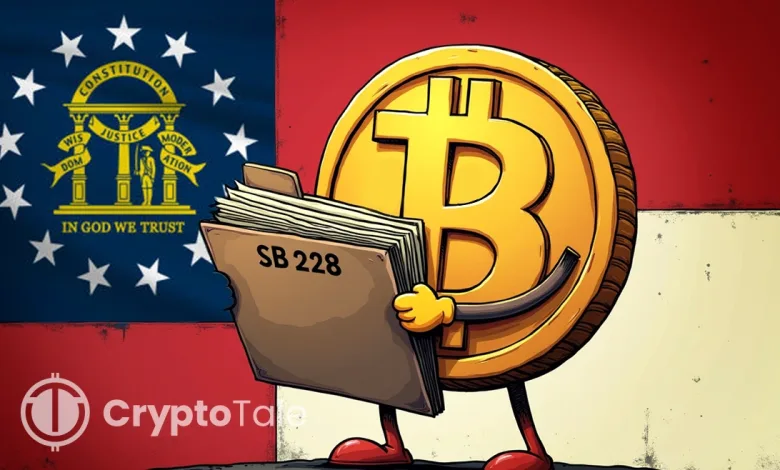Georgia’s BTC Bill Could Reshape State Investment Strategy

- Georgia’s SB 228 lets the State invest in Bitcoin with no limits, expanding choices.
- The bill allows lending Bitcoin to raise revenue while handling digital assets.
- Over 20 States consider similar laws, with Georgia taking a role in adopting reserves.
Georgia introduced its second Bitcoin reserve bill, SB 228, just ten days after its initial legislation. The bill authorizes the State treasurer to invest in Bitcoin without restrictions and also highlights Georgia’s push toward digital asset adoption. Supported by Democratic Senators Esteves, Jackson, Parent, and Jones II, it amends Section 3 of Chapter 17 of Title 50, which relates to state depositories.
This bill grants the State Depository Committee authority to enable Bitcoin investments and mandates secure storage and handling protocols. This initiative positions Georgia among U.S. states exploring Bitcoin reserves amid a shifting financial landscape.
Partisan Competition Emerge Over Bitcoin Reserve Legislation
SB 228 has emerged as a partisan competitor to Georgia’s first Bitcoin reserve bill, SB 178, which Republican sponsors introduced. While SB 178 proposed a 5% investment cap, SB 228 imposes no such restrictions, reflecting divergent legislative approaches. Analyst Julian Fahrer reported the development on X (formerly Twitter), emphasizing the contrasting factional positions.
Besides enabling unrestricted Bitcoin investments, SB 228 introduces provisions for lending state-owned Bitcoin to generate revenue. The bill seeks to repeal conflicting laws to streamline regulatory compliance. Moreover, it empowers state depository institutions to manage Bitcoin holdings under the treasurer’s supervision. This regulatory framework aims to maintain transparency, ensure proper asset management, and provide flexibility amid financial volatility.
An analysis by the Bitcoin Reserve Monitor shows that Georgia is among the 20 states considering Bitcoin reserves. Despite legislative activity, no U.S. state has enacted Bitcoin reserve laws. Utah currently leads legislative progress, while Georgia follows closely with two Senate-introduced bills.
Risk Mitigation and Custody Considerations
Including Bitcoin in state reserves has raised discussions on custody and risk management. Adam Levine, SVP at Fireblocks Trust Company, emphasized the need for specialized custody solutions for digital assets.
Levine also highlighted that most governments lack the expertise to manage digital assets independently. Hence, employing licensed custodians with cybersecurity and operational capabilities is essential. He underscored that suitable custodians can ensure that public funds are maintained securely, supporting financial stability.
Additionally, SB 228 mandates that Bitcoin purchases be handled per strict protocols to mitigate risks while ensuring investment management. These measures aim to give Georgia a competitive edge as states explore Bitcoin’s role in their financial strategies.
Related: Montana Rejects Bitcoin Reserve Bill in 42-58 House Vote
Growing National Interest in Bitcoin Reserves
Fahrer’s presentation indicates that 20 U.S. states are engaged in similar legislative efforts. Utah has advanced through multiple legislative stages, while Georgia has introduced two Senate bills. The widespread interest signals increasing recognition of Bitcoin’s potential as a strategic asset for state reserves.
With no state yet enacting such laws, Georgia’s legislative activity shows the importance of digital assets in public finance. The competition between SB 178 and SB 228 reflects differing perspectives on balancing risk and opportunity in Bitcoin investments.




